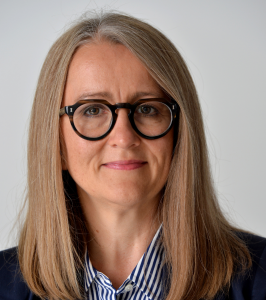Insights
How to forge gender balance in energy sector
In celebration of International Women’s Day 2022, we interviewed EV Private Equity advisory board member and Shell Global VP of Customer Solutions Renewables and Energy Solutions, Ulrika Wising.
As a well-established female figure in energy, Ulrika has gained a deep understanding of the sector and has been involved in many transformational projects, including the establishment of Shell’s first capital investment forum for power projects, and development of Shell New Energies’ integrated power strategy.
Ulrika discusses how the promotion of energy to girls in schools will shape the future workforce, her career journey as a senior executive in Shell, and what action needs to be taken collectively to ensure a fair energy transition.

To truly enable a fair and just transition, industry-wide efforts need to be funnelled to make energy an attractive career opportunity for women globally. According to the IEA, women only account for 22% in the traditional energy sector and 32% in renewables. How can we position energy to appeal to a wider female audience and forge gender balance in the energy sector?
If you look into the areas of sustainability and ESG across the board, you tend to have a high interest from women. So by positioning energy, specifically cleaner energies, with these focuses in mind, you will attract more women to the industry.
However, this introduction to the sector needs to happen as early as possible, in primary and secondary school, for this strategy to be effective. When young people start learning about energy, schools need to emphasise that strong link between sustainability and the energy mix, which will demonstrate how rewarding this career path can be.
Hopefully this approach will help paint the bigger picture to girls and show them that the energy sector is where you can make a real impact to climate change and long-term sustainability.
As a woman with an impressive career in a traditionally male dominated space, can you tell us what/who inspired you to enter the energy industry? How has your past career experience shaped you into who you are today?
I’ve worked in the energy sector my entire career, but it all started with energy efficiency when I gained my PhD at Chalmers University of Technology. Within my studies I assessed energy efficiency opportunities in industrial systems, including techno-economic analyses, environmental assessments, and global warming mitigation. After I graduated, I went on to manage a large energy optimisation research project at École Polytechnique de Montréal.
As a young woman, it excited me that I could help assist energy savings by developing and accelerating energy efficiency systems.
Throughout my professional career to date, I’ve had the opportunity to work in various aspects of energy, from upstream and downstream oil and gas to solar and battery storage.
For me, however, the energy sector wasn’t a conscious decision. It was something I stumbled across at university when I studied as a Chemical Engineer. In school, I had a very inspiring chemistry teacher, so this felt like a natural choice for me as I progressed to higher education. People told me: “If you don’t know what to do, study engineering, because then you can do anything”. Now with over a decade of energy industry experience, I couldn’t imagine working anywhere else.
Looking back, the spark definitely started with my chemistry teacher. What happens in school is so important, as it shapes the future generation and workforce.
Currently in certain non-segregated schools in the UK, girls aren’t allowed to enrol in certain subjects, which include sciences. To me, this is an incredibly outdated approach that will lead to even more of a gender gap in not only the energy sector, but other industries too.
If you’re removing young girls from studying these subjects, you’re removing 50% of the potential future workforce.

Bias is a systemic prejudice for or against something or someone, based on elements like stereotypes. Bias can impact our judgement and can be either conscious or unconscious. While conscious bias can be relatively easy to address and correct, unconscious bias can be difficult to spot. How do you think we can #BreakTheBias and forge gender balance in the energy sector?
To transform the industry, you need to ensure that there are role models for women in energy – across every stage and every level, all the way to the top.
It’s so important to promote the women that are already in the business and nurture them to flourish, in order to have groups of senior women who can then inspire others.
If you don’t see anyone that looks like you in the business, and especially not at the top, how can you be inspired to venture into that business? Taking care of the women who are already in the industry, and making sure you support their growth, is essential to making women more visible.
This is not about quotas or positive discrimination; this is about promoting diversity of thought. This approach is one I push hard when we are recruiting within Shell. As a leading energy company, you want diversity of thought everywhere, from the top to the bottom. The simple way to gain diversity of thought is to make sure you have an equal team gender balance. ‘Equal’, by definition, means that you will gain perspectives from both angles.
Another way we can break gender bias is to sponsor women in the business to help them succeed professionally. So much progress is made through informal sponsorship. However, men in the industry tend to sponsor young men and share growth opportunities with them. I think it’s important for the senior male workforce to not just sponsor males – they should take the same approach to young women too to encourage them to progress professionally. The only way to change this male-centric approach is to convince men that this is the right approach to take.
What’s really surprising to me, is that most profitability and growth studies with more women in teams show higher performance, yet we aren’t seeing a strong drive behind creating more diverse teams. If I was a male CEO, I would see those numbers and say, “in order for us to be more profitable and grow faster, we need more women!”.
Whilst more than a fifth of major corporations have pledged to reach net-zero emissions by 2050, few proactively include women and minorities in their climate action decisions and plans. What role can minorities and gender play in the transition to net zero?
I can’t stress how important it is to gain a fair representation of society in the energy transition. If you don’t, you’ll have a global energy transition that’s biased.
Personally, I’m a strong advocate of not confusing the two: general diversity and gender diversity. In all ethnicities everywhere, you have 50% women. The first step is focussing on promoting/hiring women, and often that leads to a better balance of ethnic diversities too.

As society has called for improved diversity across sectors, many schools are placing more effort into busting gender myths at an early age. Motivating girls and young women to choose STEM education and women to pursue their careers in the energy sector needs to be a key strategy. If you could offer one piece of advice to a young woman looking to kick-start a career in energy, what would you tell them?
It’s what I tell every young woman I come across that’s asking for advice, and it’s that, first, you need to lean in. Take a seat at the table, raise your hand, make your voice heard.
Second, and men do this all the time, “fake it until you make it”. I’m generalising here, but as women, we often feel like if we want to share an opinion about something, we need to know the subject inside out. We’ll have researched the topic for weeks, whereas men will have skimmed an article where they picked up two facts before they talk as experts about it.
Say those two facts you read in the article too, and say it like you mean it. Then, go home and do the research if you need to. Don’t be afraid of speaking on subjects you’re not a complete expert on. You still know enough to have an opinion.
Third, we need to nurture each other with sponsorship. Those relationships are so important. While mentorship is great, women tend to fall into its trap. Mentorship isn’t necessarily going to help you get picked for a new role or assignment. It can help you develop your skills as an individual, but sponsorship is really how you grow your career.
Meet our diverse team of advisory board members and energy transition experts here.